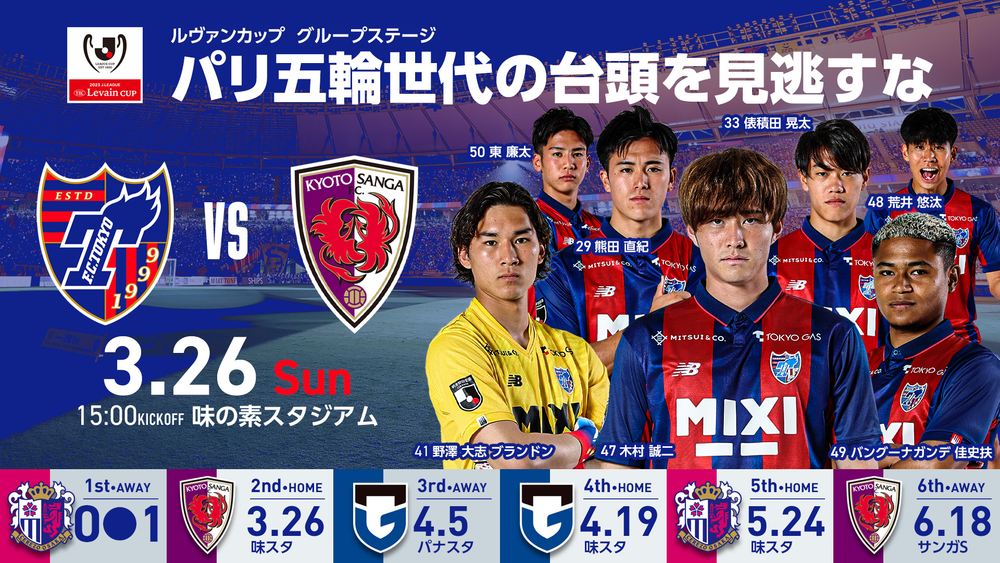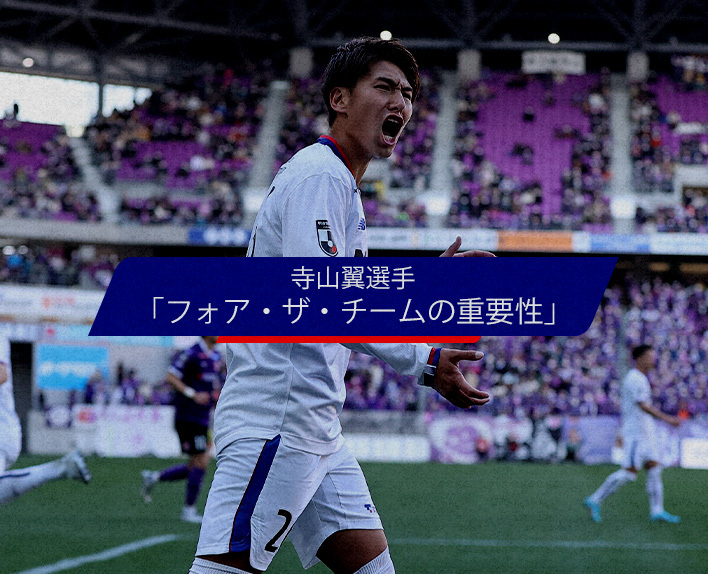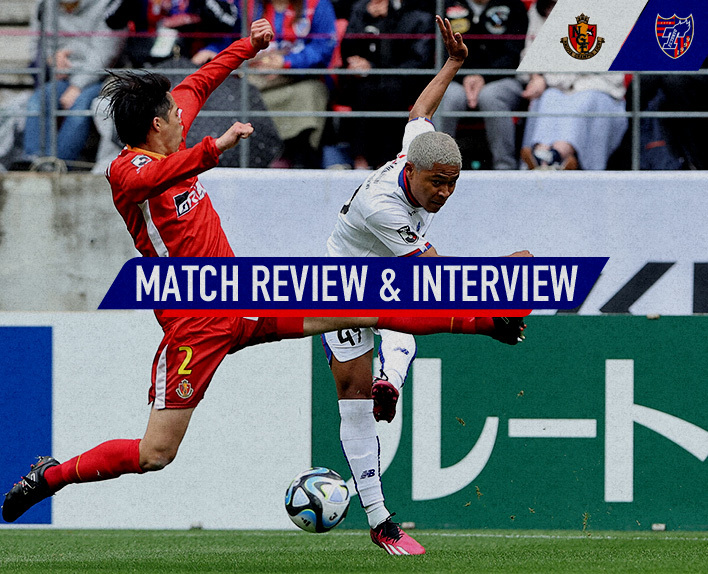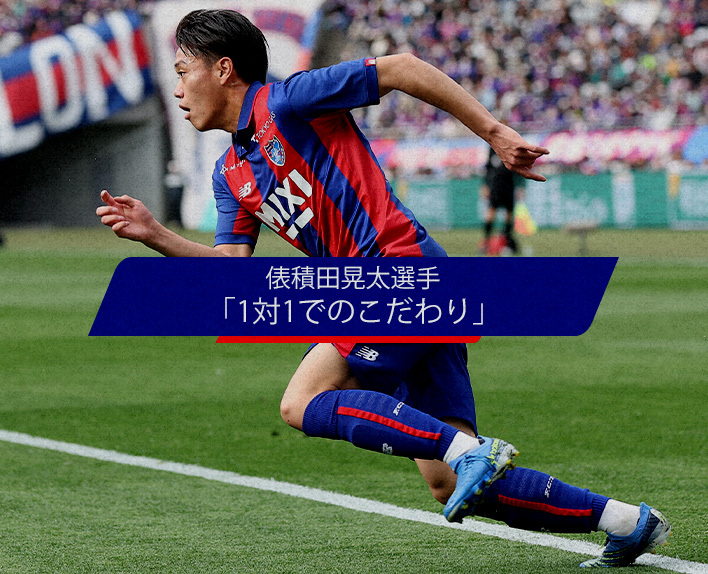Q: How did Tsubasa TERAYAMA join FC Tokyo U-15 Musashi after being in the Niiza Katayama FC youth team?
A, I belonged to the Shinza Katayama FC Youth Team and when I won the All Japan U-12 Soccer Championship and became the top scorer, I was approached by someone from Tokyo. That was the starting point.
Q, what was the reason for changing your position from forward to midfielder?
At the beginning of his third year of junior high school, Rei HIRAKAWA was not able to participate in team activities due to his involvement in the national team. At the time, there were also injuries among the players in the defensive midfield position, causing a shortage of players. Coach Masahito KYOZOE suggested that he try playing in the defensive midfield position, and from there he made the switch. As he had not been able to play much as a forward, he saw the opportunity to play in the defensive midfield position as a new challenge. When he joined FC Tokyo U-15 Musashi, he was surprised by HIRAKAWA's skill. Even during practice and while on the bench, he consciously watched his play. He did not have any negative feelings about playing in the defensive midfield position.
Q: What was the reason you started playing soccer, even though you had a dream of becoming a carpenter when you were a child?
I was watching a TV program called "A, Densetsu no Daiku" (A, Close-up on Carpenters). The family who is having their house built was very happy, and I felt cool watching them carefully building the house, so I wanted to become a carpenter. The reason I started playing soccer is because my older brother played soccer, and I used to go with my parents to watch his games. I started playing soccer because I thought it was cool due to that influence.
Q: Did you have a strong determination when you were a child, and is it still the same now?
A, being competitive and hating to lose is the most distinctive characteristic within myself. Although I didn't consciously put effort into it, I believe that I naturally put in effort and energy towards my emotions and things.
Q, I started aiming to become a professional soccer player when I was in the fourth grade of elementary school.
When I was in the fourth grade, I liked soccer, of course, but I wanted to play basketball. However, the Shinzato Katayama FC youth team I belonged to made it to the semifinals of the national tournament, and I had the opportunity to go watch. When I saw that game and witnessed the seniors fighting on the field, I was instantly moved and felt that I also wanted to stand on this stage. I thought it would feel great to play in front of many people and win the game, so I started dedicating myself to soccer seriously and began aiming to become a professional soccer player.
Q, there was a mention of directing oneself towards Victor in order to become a professional, but please explain specifically.
There were players around who tended to blame others when things didn't go well. I always thought that it's about directing your own vector and then figuring out how to deal with the surroundings. In the end, I had the impression that players who couldn't direct their vector well were often not successful. Watching that, I felt the importance of directing my own vector.

Q, when you were a member of FC Tokyo U-18, do you remember your official debut in the J3 League Sec. 20 match against YSCC Yokohama?
He was registered as a Type A and made his debut in the next day's match. He played as a substitute for Yohei KAJIYAMA. I was excited to step onto the pitch, replacing such an amazing player who had carried Tokyo on his back, and I remember it vividly. After playing, I was able to feel how amazing the professional pitch is with my own skin.
Q: How did you feel about playing in J3 while belonging to U-18? I think you were accompanying the team while not participating in the youth matches, how did you feel?
A, what I always valued was how I could contribute to the team. I was conscious of continuing to do so, whether it was in J3 or in the youth team.
Q, what are the things that have given you confidence on the field and what do you think are the challenges?
There was a significant difference in intensity between the A and youth teams. In the youth team, there were parts where I could play with ease, but those parts didn't work in the top team. Even in terms of the accuracy of each pass, in soccer, where you only touch the ball for about 2 minutes per person in a 90-minute game, it becomes important how well you can play without making mistakes. The players in the top team make fewer mistakes, and I also felt a difference in consciousness and the quality of play when talking to them.
Q: What were your goals during your three years in high school?
A, of course, I was promoted to the top team. Around the summer of my third year of high school, I received a call from the staff in Tokyo. At first, the promotion to the top team was put on hold. After the Japan Club Youth Soccer Championship ended, the promotion to the top team was postponed.
Q: What was the reason for entering Juntendo University?
I participated in the practice of Juntendo University and Meiji University. Meiji University has a high intensity of practice and is one of the teams leading university soccer, having won many titles. At first, I was considering going to Meiji University. At Juntendo University, I had the impression that there were more skilled players than strong players. I had a strong desire to improve my soccer skills, and by actually participating in the practice, I was able to learn that there were many skilled players, so I decided to go to Juntendo University.
Q, U-18, and university, I think you served as a captain. What do you feel is the reason you were entrusted with the captaincy?
A, I think I was evaluated for the part that I value the most, which is for the team. I made an effort to increase the number of times I encouraged my teammates during the game, and I have been conscious of it even before being appointed as the captain.
Q: Do you have a mentor who has been influential in your growth? Are there any turning points that have been catalysts for your development?
A, these are the people who have been involved so far. I have been fortunate to meet and be coached by really good coaches and staff. Everyone is a mentor, but Coach Makoto KITA, who coached me in my first year of junior high school, was very caring and always talked to me. He taught me various things even when things didn't go well. I am very grateful. I also learned a lot from Coach Mae during my four years at Juntendo University, where he was the coach. I am truly grateful because I felt that I grew the most during those four years.
Q: How was the period of injury?
It was an injury right before the start of the university league. I felt more frustrated than anxious. I switched my mindset to accepting what had happened and focused on rehabilitating as quickly as possible to get back on the pitch.
Q: I think it's also a preparation period for professionals, what were you conscious of in college?
A, becoming a college student, I realized that it really depends on myself when I have a lot of time. What I focused on was not only giving 100% in practice, but also thinking about what is expected of me by the coach while expanding my own strengths and making up for any shortcomings through self-training. In the professional world, players who have graduated from college are often referred to as immediate contributors. I also worked hard in practice with the hope of becoming an immediate contributor. After deciding to turn pro, I felt that I had to work hard as an immediate contributor as a player who went through college while there were players who were promoted from the youth team. I worked hard for four years in college to return to Tokyo.
Q: I think you were also selected for the All Japan University Selection and the Japan National Team by age group. Please tell us about your thoughts on representing the national team now.
A, watching the Qatar World Cup and feeling so frustrated through the screen was a first for me. I also wanted to stand on the World Cup pitch myself. Kashif BANGNAGANDE has been selected for the Japan national team this time, and it's a great motivation to see a player younger than me being chosen for the national team. I believe that if we can achieve results as a team, the Japan national team is not far away in the world, and if we constantly seek results and play, we can naturally get closer to the Japan national team. I want to focus on continuing and achieving results.
Q: Do you think that players of the same generation are also in the Japanese national team? First of all, do you want to achieve results with the team? And are there any rival players?
A, the players who entered the professional league this season after graduating from university are rivals. I have a strong desire to be the first to join the national team.
Q: What do you think is expected in Tokyo? Albert Pobor highly values the mental aspect, but how do you feel?
A, rather than myself, there are things that are required for the entire team and each position. I hope to constantly play by inputting the overall way of doing things. The parts that are being evaluated are the parts where I can give instructions during the game and be tough in the ball contest, and I think it's the attitude of challenging multiple times.
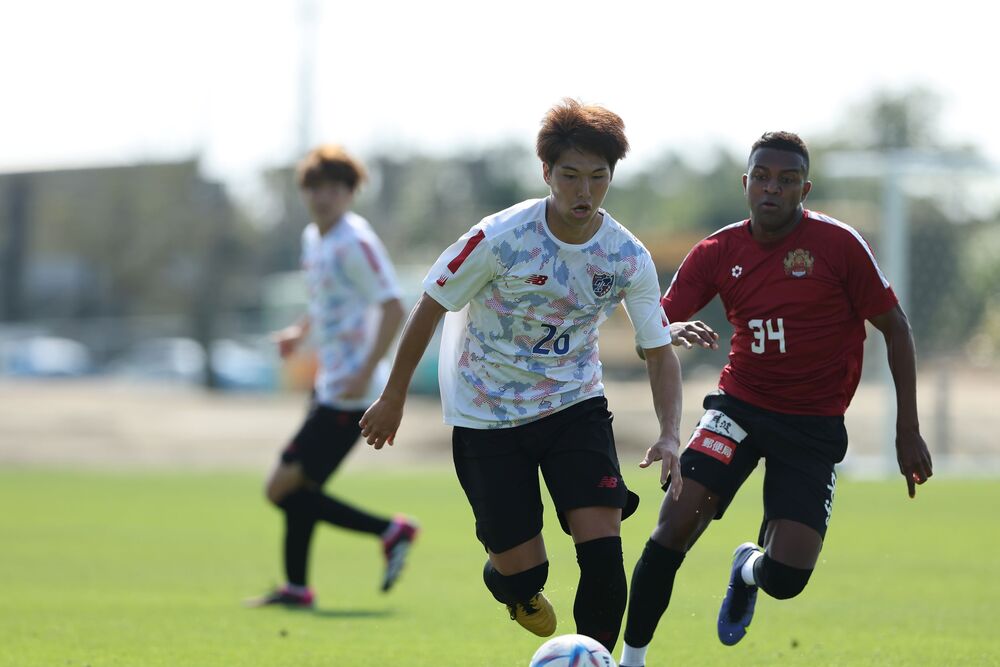
Q: "If you were to have a brother among your teammates, who would it be?" and "Who is your close friend on the team?" In response to these questions, Hotaka NAKAMURA mentioned Ryo NAKAMURA. What made you choose him?
The first reason is his stoic attitude. We were roommates during camp, and he would stretch in the room before practice. He is also particular about his meals and I could feel that he plans and lives his daily life with intention. I was influenced by his stoic attitude. He is easy to talk to, like a friend, even though he is a senior. Of course, I have a good relationship with my teammate Nishido Hisatoshi and also with Abe Shuto and Tsukagawa Koki. Recently, Koizumi Kei took me to a cafe. Tokyo has really talented players and it's fun.
Q: In Tokyo, there is a favorite chant that says "The city that never sleeps". I think it's a song that I often heard since my academy days. It was also impressive to hear it sung loudly after the last home game.
A, I think "The City That Never Sleeps" is a chant that is sung when Tokyo wins. When we hear it during the game, especially towards the end, it really gets our spirits high. I believe it also serves as a driving force for the players to give that extra push. I got goosebumps when I heard it on the pitch.
Q: You mentioned Jose KANTE as your favorite foreign player. How do you plan to utilize his playing style?
A, there is no player who can steal the ball, run, and have high quality in both offense and defense like Jose KANTE. I want to become a player who can do the same and I believe I can. I watch highlight reels of Kante's plays. I also watch J-League games frequently. Although I don't have a specific player in mind, I sometimes watch players in the same position as me to see their movements and learn from them.
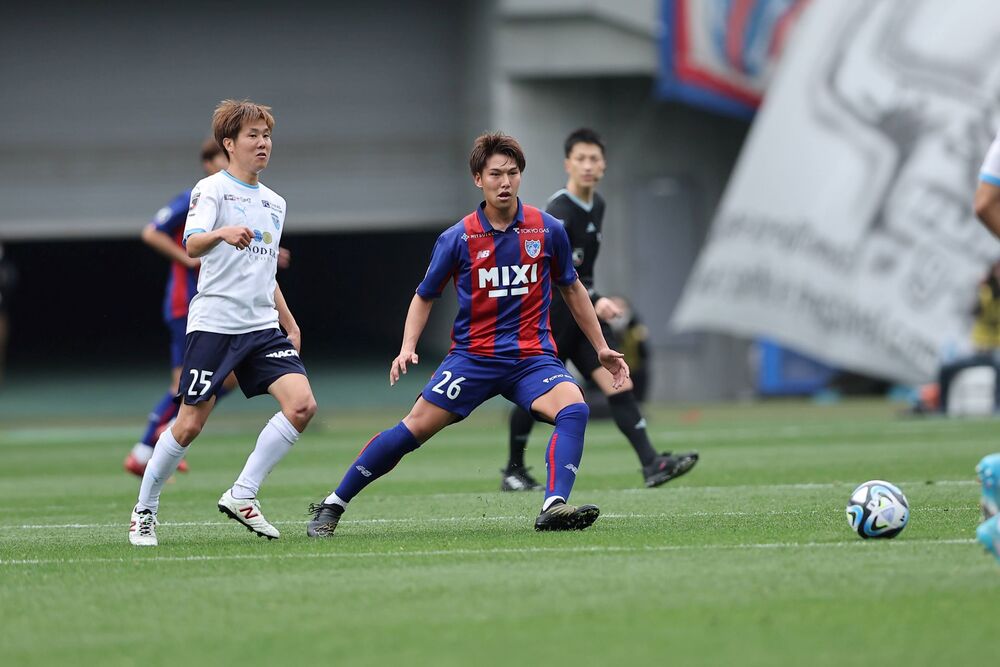
Q: What kind of year do you want the 2023 season to be? Please tell us the team's goals and individual goals.
As a team, the goal is to win the upcoming match and become the league champions. As an individual, it is to participate in more matches, contribute to the team's victories, and deliver many wins to the fans and supporters. I want to increase the number of plays that lead to goals.
Q: What is the strength of Tsubasa TERAYAMA when it comes to football?
I want you to see the attitude of fighting for the ball.
Q: When asked what is good about being a soccer player, he answered "There are many high-level players and a lot of stimulation." What kind of stimulation do you receive?
A, coming from university to the professional world, I felt the intensity first and foremost. Keigo HIGASHI and all the players, when I went to ask questions during practice, they were thinking one or two steps ahead and their decision-making speed in play is incredibly fast. That's still an area that I need to improve on, and it's very motivating.
Q: Do you have any message for children who dream of becoming professional soccer players?
First of all, I think it's important to enjoy football when becoming a professional. If you enjoy it, you will practice and be able to approach it thoughtfully.
Q: Finally, do you have a message for the fans and supporters?
A, I really want to win the title this season no matter what. I would like to have the support of many fans. I will do my best to respond to their cheers.
